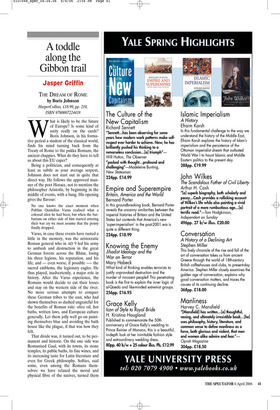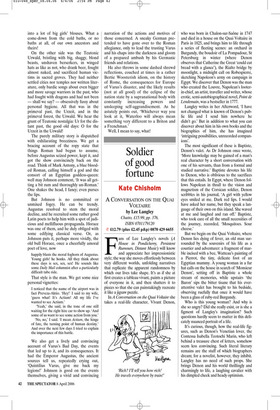A toddle along the Gibbon trail
Jasper Griffin
THE DREAM OF ROME by Boris Johnson HarperCollins, £18.99, pp. 210, ISBN 9780007224418 What is likely to be the future of Europe? Is some kind of unity really on the cards? Boris Johnson, in his formative period a student of the classical world, finds his mind turning back from the Treaty of Rome to the pukka Romans, the ancient chappies. What do they have to tell us about this EU caper?
Being a politician, and consequently at least as subtle as your average serpent, Johnson does not start out in quite that direct way. He follows the approved manner of the poet Horace, not to mention the philosopher Aristotle, by beginning in the middle of events, with a bang. His opening gives the flavour:
No one knows the exact moment when Publius Quintilius Varus realised what a colossal idiot he had been, but when the barbarians on either side of him started uttering their war cry we must assume that the penny finally dropped.
Varus, in case these events have rusted a little in the memory, was the aristocratic Roman general who in AD 9 led his army to ambush and destruction in the great German forests across the Rhine, losing his three legions, his reputation, and his life, and — even worse, if possible —– the sacred emblems, the legionary eagles. He thus played, inadvertently, a major role in history. After the Varus experience, the Romans would decide to cut their losses and stay on the western side of the river. No more serious attempts to conquer these German tribes to the east, who had shown themselves so dashed ungrateful for the benefits of Roman rule: olive oil, hot baths, written laws, and European culture generally. Let them jolly well go on painting themselves blue and avoiding the bath house like the plague, if that was how they felt.
That divide was, it turned out, to be permanent and historic. On the one side was Romanised Gaul, with its towns, its stone temples, its public baths, its fine wines, and its increasing taste for Latin literature and even for Greek philosophy. Softies, said some, even among the Romans themselves: we have relaxed the moral and physical fibre of the natives, turned them into a lot of big girls’ blouses. What a come-down from the cold baths, or no baths at all, of our own ancestors and theirs!
On the other side was the Teutonic Urwald, bristling with big, shaggy, blond beasts, unshaven berserkers, in winged hats as like as not, who drank beer, fought almost naked, and sacrificed human victims in sacred groves. They had neither settled cities nor temples nor written literature, only bardic songs about even bigger and more savage warriors in the past, who had fought with dragons and had not been — shall we say? — obsessively fussy about personal hygiene. All that was in the primeval past, the Urzeit, and in the primeval forest, the Urwald. We hear the grunt of Teutonic nostalgia: Ur for the distant past, the good old days: O for the Urzeit in the Urwald!
The purely military story is dispatched with exhilarating breeziness. We get a bracing account of the ropy state that things Roman had begun to assume, before Augustus seized power, kept it, and got the show convincincly back on the road. Think of Mark Antony, a blue blooded Roman, calling himself a god and the consort of an Egyptian goddess-queen: well may Johnson comment, ‘It was all getting a bit rum and thoroughly un-Roman.’ One shakes the head, I fancy; even purses the lips.
But Johnson is no committed or unmixed fogey. He can be trendy. Augustus resolved to stem the moral decline, and he recruited some rather good Latin poets to help him with a spot of judicious and mellifluous propaganda. Horace was one of them, and he duly obliged with some edifying classical verse. Or, as Johnson puts it, perhaps more vividly, the old bull Horace, once a cheerfully amoral poet of love, now happily blasts the moral foghorn of Augustus. Young girls! he honks. All they think about these days is sex, sex, sex! He sounds like some Daily Mail columnist after a particularly difficult tube ride.
That style is the man. We get some nice personal vignettes:
I noticed that the name of the airport was in fact Preveza-Aktio. ‘Hey!’ I said to my wife, ‘guess what! It’s Actium! All my life I’ve wanted to see Actium.’ ‘Yeah,’ she said, in the tone of one still waiting for the right hire car to show up. ‘And some of us want to see some action from you.’
‘No, no,’ I said. ‘I mean Actium, the hinge of fate, the turning point of human destiny.’ And over the next few days I tried to explain the importance of this battle.
We also get a lively and convincing account of Varus’s Bad Day, the events that led up to it, and its consequences. It had the Emperor Augustus, the ancient sources tell us, repeatedly crying out, ‘Quintilius Varus, give me back my legions!’ Johnson is good on the events themselves, giving a vivid and convincing narration of the actions and motives of those concerned. A sneaky German pretended to have gone over to the Roman allegiance, only to lead the trusting Varus and his chaps into the darkness and gloom of a prepared ambush by his Germanic friends and relations.
He also throws in some dashed shrewd reflections, couched at times in a rather Bertie Woosterish idiom, on the history of Rome, the consequences for Europe of Varus’s disaster, and the likely results (not at all good) of the eclipse of the nation state by a supranational body with constantly increasing powers and unsleeping self-aggrandisement. As he astutely points out, ‘Whichever way you look at it, Waterloo will always mean something very different to a Briton and a Frenchman.’ Well, I mean to say, what!











































































 Previous page
Previous page